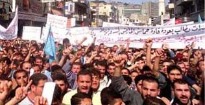What US Learned by Talking to Muslim Brotherhood
 Writing in The New Republic, Eli Lake reviews America's history of Islamist outreach:
Writing in The New Republic, Eli Lake reviews America's history of Islamist outreach:
The current wave of democratic uprisings in the Middle East is a welcome development. But it will almost certainly empower long-suppressed political parties inspired by the Muslim Brotherhood. That movement—whose slogan reads, in part, “Koran is our law; Jihad is our way”—presents several urgent challenges for American policymakers: How can political parties that seek Islamic law through holy struggle be cajoled and pressured to respect the rules of democratic politics? Is political Islam even compatible with open, civil societies? And under what circumstances should Washington engage with such movements?
As it happens, a number of individuals in the U.S. government have grappled with these very questions in recent decades. Over the last few weeks, I spoke to some of them to find out what they had learned.
...
Nowhere were the dilemmas involved in outreach to Islamists more stark than in Egypt. The Egyptian Muslim Brotherhood had been founded in 1928, but split several decades later. The radical faction—including Ayman Al Zawahiri, who would become the second-in-command of Al Qaeda—embraced political violence. The less radical faction eventually renounced violence against the Egyptian government (though not against Israel) and instead vowed to pursue the goal of an Islamic state by persuading Muslims to turn toward Islam. Beginning in the 1970s, these moderates engaged in an uncomfortable dance with the secular Egyptian regime. Hosni Mubarak allowed them to participate unofficially in parliamentary elections, and, by the 1990s, they were involved in most aspects of Egyptian public life. “In the 1990s, because the Muslim Brotherhood was involved in all facets of the society, from labor to NGOs, if you wanted to talk to different segments of Egyptian society, you would have to run into the Muslim Brotherhood,” recalls Emile Nakhleh, who was hired by the CIA in 1990 as a scholar-in-residence of political Islam.
Ibrahim El Houdaiby, a former youth leader of the Muslim Brotherhood who left the group in 2008, and Essam El Erian, a spokesman for the Muslim Brotherhood in Cairo, both acknowledge that the United States reached out to the group over the years. El Houdaiby says the Brotherhood leaders and American diplomats were often wary of one another. “I would say the main characteristic of these talks, there was lots of mutual skepticism,” El Houdaiby says. “Both sides were very skeptical of going into talks. Both sides had lots of worries about the possible outcomes. The concern was how the meetings themselves would provoke the Mubarak regime.”
In 1998, Mubarak abruptly canceled the talks, according to two former U.S. officials with direct knowledge of the discussions. One former U.S. intelligence official says, “Mubarak did not want to give legitimacy to the Brotherhood by having the U.S. contact these groups. In his view, and perhaps correctly, the meetings were giving them more legitimacy. He did not want to give any group legitimacy other than the Mubarak regime.” The CIA and the U.S. Embassy in Cairo complied with his wishes.
But that was hardly the end of U.S. contact with Islamists. In 2004, Nakhleh, a Palestinian-American Christian who was born in Nazareth, founded the CIA’s Political Islam Strategic Analysis Program, which quietly reached out to Islamists. By Nakhleh’s own account, he has visited more than 30 countries through the years and interviewed hundreds if not thousands of Islamists—moderates, radicals, sympathizers of the Taliban, and members of the Muslim Brotherhood. In his meetings with various Islamists, Nakhleh says he was most often asked why the United States supports regimes that repress Islamist parties. “The regimes were the top issue,” he says.
Some in the Bush administration agreed that the United States needed more contact with these groups. After the 2005 Egyptian elections, in which Brotherhood-affiliated candidates won 88 seats in the national assembly, the U.S. Embassy began to reach out to the new parliamentarians. “The Muslim Brotherhood was illegal in Egypt, but certain parliamentarians who were connected to the Muslim Brotherhood were, we felt, worth talking to,” says Elliott Abrams, who was a deputy national security adviser.
This engagement did not necessarily equal endorsement; there was a recognition that, as Rhode had suspected, Islamists could be simply telling the United States what it wanted to hear. Mary Habeck, an expert on political Islam who worked at the National Security Council during the Bush administration, says, “The Muslim Brotherhood has been so persecuted from day one, they are unbelievably secretive and deceptive. This is why many people who study the movement have trouble believing them even when they say they are dedicated to democracy.” ...
Click here to read more.

